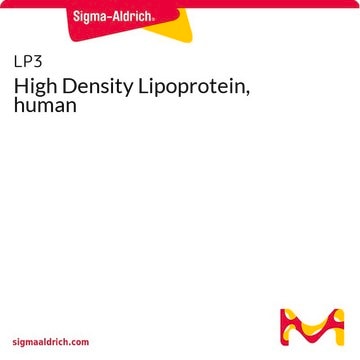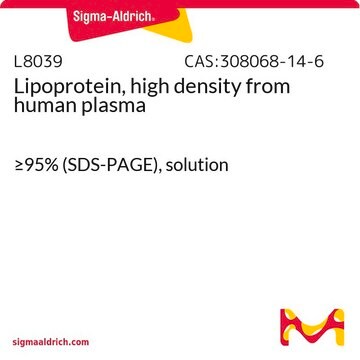MAK192
Cholesterol Efflux Assay Kit
Sufficient for 100 Fluorometric tests
Sign Into View Organizational & Contract Pricing
All Photos(2)
About This Item
UNSPSC Code:
12161503
Recommended Products
application(s)
cosmetics
food and beverages
pharmaceutical
detection method
fluorometric
relevant disease(s)
cardiovascular diseases
storage temp.
−20°C
General description
Reverse Cholesterol Transport (RCT) is the mechanism by which the peripheral lipid burden is reduced by transport to liver and its fecal excretion. The first important step in RCT is the cholesterol efflux from macrophage-derived foam cells present in atherosclerotic plaques. The cholesterol efflux is critical for the maintenance of net cholesterol balance in arterial walls and in the reduction of proinflammatory responses triggered by lipid-laden macrophages.
Application
Cholesterol Efflux Assay Kit has been used in cholesterol efflux assay.
Features and Benefits
Compatible with high-throughput handling systems.
Suitability
Suitable for the determination of cholesterol efflux in cells.
Principle
The Cholesterol Efflux Assay Kit is a high-throughput screening assay that measures cholesterol efflux in cells using fluorescent-labeled cholesterol (λEx = 482 nm/ λEm = 515 nm). It is suitable for serum, isolated, or recombinant lipoprotein samples. It may also be used to screen small molecules for their effect on cholesterol efflux and therefore, may be a valuable tool in drug discovery programs.
Kit Components Only
Product No.
Description
- Labeling Reagent
- Equilibration Buffer
- Reagent A
- Reagent B
- Cell Lysis Buffer
- Positive Control
- Serum Treatment Reagent
Signal Word
Warning
Hazard Statements
Precautionary Statements
Hazard Classifications
Eye Irrit. 2
Storage Class Code
10 - Combustible liquids
Flash Point(F)
188.6 °F - closed cup
Flash Point(C)
87 °C - closed cup
Certificates of Analysis (COA)
Search for Certificates of Analysis (COA) by entering the products Lot/Batch Number. Lot and Batch Numbers can be found on a product’s label following the words ‘Lot’ or ‘Batch’.
Already Own This Product?
Find documentation for the products that you have recently purchased in the Document Library.
Customers Also Viewed
Lipoprotein apheresis affects lipoprotein particle subclasses more efficiently compared to the PCSK9 inhibitor evolocumab, a pilot study.
Lappeg?rd K T, et al.
Transfusion and Apheresis Science : Official Journal of the World Apheresis Association : Official Journal of the European Society for Haemapheresis, 57(1), 91-96 (2018)
Huifeng Pi et al.
Journal of cellular and molecular medicine, 23(8), 5259-5269 (2019-05-24)
The formation of fat-laden foam cells, which contributes to the fatty streaks in the plaques of atheromas, is an important process in atherosclerosis. Vascular smooth muscle cells (VSMCs) are a critical origin of foam cells. However, the mechanisms that underlie
Christian Abendstein Kjellmo et al.
Journal of clinical lipidology, 12(1), 193-202 (2017-11-18)
Bariatric surgery has been shown to reduce cardiovascular events and cause-specific mortality for coronary artery disease in obese patients. Lipoprotein biomarkers relating to low-density lipoprotein (LDL), high-density lipoprotein (HDL), their subfractions, and macrophage cholesterol efflux have all been hypothesized to
Bariatric surgery improves lipoprotein profile in morbidly obese patients by reducing LDL cholesterol, apoB, and SAA/PON1 ratio, increasing HDL cholesterol, but has no effect on cholesterol efflux capacity.
Kjellmo C A, et al.
Journal of Clinical Lipidology, 12(1), 193-202 (2018)
Marc Clément et al.
Circulation, 134(14), 1039-1051 (2016-09-03)
Atherosclerotic lesion expansion is characterized by the development of a lipid-rich necrotic core known to be associated with the occurrence of complications. Abnormal lipid handling, inflammation, and alteration of cell survival or proliferation contribute to necrotic core formation, but the
Our team of scientists has experience in all areas of research including Life Science, Material Science, Chemical Synthesis, Chromatography, Analytical and many others.
Contact Technical Service










